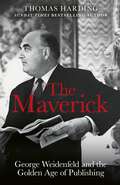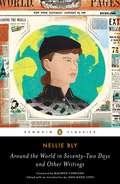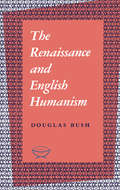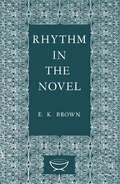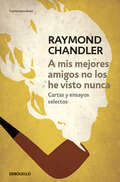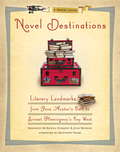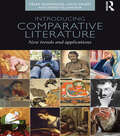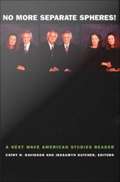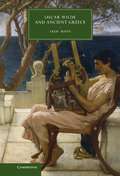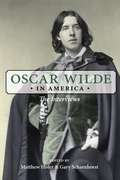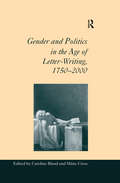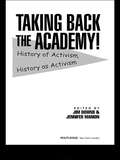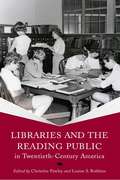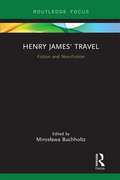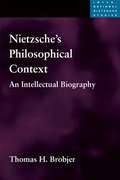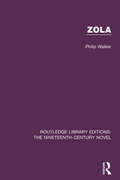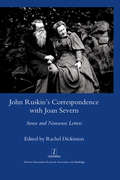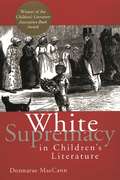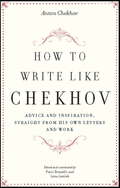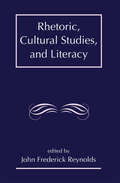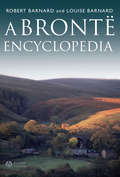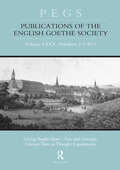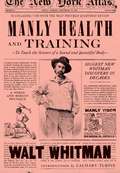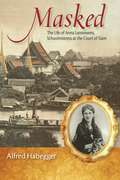- Table View
- List View
The Maverick: George Weidenfeld and the Golden Age of Publishing
by Thomas HardingBorn into a Jewish family in Vienna in 1919, George Weidenfeld fled to England in 1938 to escape the Nazi regime. There he began a career in publishing that would make him one of the most influential figures in the industry. Over the course of his long and illustrious career he championed some of the most important voices of the twentieth century, from Vladimir Nabokov, Mary McCarthy and Saul Bellow to Harold Wilson, Isaiah Berlin and Henry Kissinger.But what do we know about the man himself? Was he, as described by some, the 'greatest salesperson', 'the world's best networker', 'the publisher's publisher' and 'a great intellectual'? Was his lifelong effort to be the world's most famous host a cover for his desperate loneliness? Who, in fact, was the real George Weidenfeld and how did he rise so successfully within the ranks of London and New York society? Providing a full, unvarnished and at times difficult history of this complex man, this first biography of a titan of culture is also a story of resilience, determination and the power of ideas to shape history.
Around the World in Seventy-Two Days and Other Writings
by Nellie BlyA collection of the articles and writings of famed American journalist Nellie Bly. .
The Renaissance and English Humanism
by Douglas BushThe appearance of a fourth printing of The Renaissance and English Humanism indicated the scholarly success this book has enjoyed for more than a decade. As a brief yet thoughtful and eloquent evaluation of the influence of the Christian humanistic tradition upon our culture it has not been surpassed. The study is divided into four parts: in the first, Professor Bush discusses modern theories of the Renaissance; in the second and third, the character of classical humanism on the Continent and in England; and in the fourth, the place of Milton in the humanistic tradition."Douglas Bush has shown an unusual awareness," wrote Wallace K. Ferguson, "of the historiographical evolution of the Renaissance, and has taken his stand with rare explicitness on the side of those who find the Renaissance filled with mediaeval traditions." Professor Bush sees the dominant ideal of the English Renaissance as rational and religious order, rather than rebellious individualism, and his view has provided an important clue to the English literature and thought of the 16th and the earlier 17th century.
Rhythm in the Novel
by E. K. BrownThe Alexander Lectures for 1949-50. In his Preface, Professor Brown says, "Isolating a single element or group of elements in the novel, and considering it in unreal separation from all the other elements which it actually fuses, is artificial, but so is all criticism. The artificiality is justified if when one turns back from the criticism to the novels these appear more intelligible and more delightful. That is the test." Applying the test to Dr. Brown's present work, the method is more than justified by the results. they are titled: "Phrase, Character, Incident," "Expanding Symbols," "Interweaving Themes," and "Rhythm in E.M. Forster's A Passage to India."
A mis mejores amigos no los he visto nunca: Cartas y ensayos selectos
by Raymond ChandlerUn viaje excepcional al mundo de Chandler, marcado por la genialidad, el alcoholismo, la soledad y la visión crítica de la industria del cine. Una lectura fundamental para los fans del género. A mis mejores amigos no los he visto nunca recoge una amplísima selección de la correspondencia y la obra periodística de Raymond Chandler, y constituye como tal un volumen inédito. Aquí se desvelan sus reflexiones literarias, que se caracterizan por un gran sentido del humor, los secretos de su personalidad siempre al borde del abismo, su intuición artística, su curiosidad intelectual y su tormentosa relación con Hollywood. La primera parte del libro es una antología de sus cartas a amigos, editores, agentes y colegas que se lee como una fascinante biografía. La segunda parte consiste en una decena de artículos escritos para la prensa -varios nunca antes traducidos- , que retratan su cambiante visión del mundo a lo largo de los años. Reseña:La obra de Chandler me parece tan imprescindible literariamente como pueda serlo la de Hemingway o Scott Fitzgerald.»Manuel Vázquez Montalbán
Novel Destinations: Literary Landmarks From Jane Austen's Bath to Ernest Hemingway's Key West
by Mckenna Schmidt ShannonPeppered with great reading suggestions and little-known tales of literary gossip, Novel Destinations is a unique travel guide, an attractive gift book, and the ultimate browser's delight.
Introducing Comparative Literature: New Trends and Applications
by Haun Saussy César Domínguez Darío VillanuevaIntroducing Comparative Literature is a comprehensive guide to the field offering clear, concise information alongside useful analysis and examples. It frames the introduction within recent theoretical debates and shifts in the discipline whilst also addressing the history of the field and its practical application. Looking at Comparative Literature within the context of globalization, cosmopolitanism and post or transnationalism, the book also offers engagement and comparison with other visual media such as cinema and e-literature. The first four chapters address the broad theoretical issues within the field such as 'interliterary theory', decoloniality, and world literature, while the next four are more applied, looking at themes, translation, literary history and comparison with other arts. This engaging guide also contains a glossary of terms and concepts as well as a detailed guide to further reading.
No More Separate Spheres!: A Next Wave American Studies Reader
by Cathy N. Davidson Jessamyn HatcherNo More Separate Spheres! challenges the limitations of thinking about American literature and culture within the narrow rubric of "male public" and "female private" spheres from the founders to the present. With provocative essays by an array of cutting-edge critics with diverse viewpoints, this collection examines the ways that the separate spheres binary has malingered unexamined in feminist criticism, American literary studies, and debates on the public sphere. It exemplifies new ways of analyzing gender, breaks through old paradigms, and offers a primer on feminist thinking for the twenty-first century. Using American literary studies as a way to talk about changing categories of analysis, these essays discuss the work of such major authors as Catharine Sedgwick, Herman Melville, Pauline E. Hopkins, Frederick Douglass, Catharine Beecher, Ralph Waldo Emerson, W. E. B. Du Bois, Sarah Orne Jewett, Nathaniel Hawthorne, María Ampara Ruiz de Burton, Ann Petry, Gwendolyn Brooks, Cynthia Kadohata, Chang Rae-Lee, and Samuel Delany. No More Separate Spheres! shows scholars and students different ways that gender can be approached and incorporated into literary interpretations. Feisty and provocative, it provides a forceful analysis of the limititations of any theory of gender that applies only to women, and urges suspicion of any argument that posits "woman" as a universal or uniform category. By bringing together essays from the influential special issue of American Literature of the same name, a number of classic essays, and several new pieces commissioned for this volume, No More Separate Spheres! will be an ideal teaching tool, providing a key supplementary text in the American literature classroom. Contributors. José F. Aranda, Lauren Berlant, Cathy N. Davidson, Judith Fetterley, Jessamyn Hatcher, Amy Kaplan, Dana D. Nelson, Christopher Newfield, You-me Park, Marjorie Pryse, Elizabeth Renker, Ryan Schneider, Melissa Solomon, Siobhan Somerville, Gayle Wald , Maurice Wallace
Oscar Wilde and Ancient Greece
by Iain RossFrom his boyhood Oscar Wilde was haunted by the literature and culture of ancient Greece, but until now no full-length study has considered in detail the texts, institutions and landscapes through which he imagined Greece. The archaeology of Celtic Ireland, explored by the young Wilde on excavations with his father, informed both his encounter with the archaeology of Greece and his conviction that Celt and Greek shared a hereditary aesthetic sensibility, while major works such as The Picture of Dorian Gray and The Importance of Being Earnest maintain a dynamic, creative relationship with originary texts such as Aristotle's Ethics, Plato's dialogues and the then lost comedies of Menander. Drawing on unpublished archival material, Oscar Wilde and Ancient Greece offers a new portrait of a writer whose work embodies both the late-nineteenth-century conflict between literary and material antiquity and his own contradictory impulses towards Hellenist form and the formlessness of desire.
Oscar Wilde in America: The Interviews
by Gary Scharnhorst Matthew Hofer Oscar WildeBetter known in 1882 as a cultural icon than a serious writer, Oscar Wilde was brought to North America for a major lecture tour on Aestheticism and the decorative arts. With characteristic aplomb, he adopted the role as the ambassador of Aestheticism, and he tried out a number of phrases, ideas, and strategies that ultimately made him famous as a novelist and playwright. This exceptional volume cites all ninety-one of Wilde's interviews and contains transcripts of forty-eight of them, and it also includes his lecture on his travels in America.
Gender and Politics in the Age of Letter-Writing, 1750–2000
by Máire CrossLetters have long been an outlet for political expression, whether they articulate the personal politics of the daily routine or the political views of individuals who witness or participate in dramatic events. In addition, letters can be unusually revealing records of the relations between men and women. Though letters have frequently been studied as a privileged space for literary, social, and cultural expression, the three-dimensional relationship of politics, gender, and letters has not been the focus of an entire volume. The nineteen essays in this collection examine how the gendered nature of political literacy is revealed over a 250-year period through letter writing, whether the writer is famous or unknown, the wife of a prominent politician or activist, a political prisoner or political militant. Ranging wide in terms of subject matter and geography, the contributors examine correspondence that ponders familial concerns, as well as letters providing political commentary on the effects of war or revolution on everyday life. Among the impressive group of international scholars are Jim Allen, Clare Brant, Edith Gelles, Jane Rendall, and Siân Reynolds.
Taking Back the Academy!: History of Activism, History as Activism
by Jim Downs Jennifer ManionFirst published in 2004. Routledge is an imprint of Taylor & Francis, an informa company.
Libraries and the Reading Public in Twentieth-Century America
by Christine Pawley Louise S. RobbinsFor well over one hundred years, libraries open to the public have played a crucial part in fostering in Americans the skills and habits of reading and writing, by routinely providing access to standard forms of print: informational genres such as newspapers, pamphlets, textbooks, and other reference books, and literary genres including poetry, plays, and novels. Public libraries continue to have an extraordinary impact; in the early twenty-first century, the American Library Association reports that there are more public library branches than McDonalds restaurants in the United States. Much has been written about libraries from professional and managerial points of view, but less so from the perspectives of those most intimately involved patrons and librarians. Drawing on circulation records, patron reviews, and other archived materials, Libraries and the Reading Public in Twentieth-Century America underscores the evolving roles that libraries have played in the lives of American readers. Each essay in this collection examines a historical circumstance related to reading in libraries. The essays are organized in sections on methods of researching the history of reading in libraries; immigrants and localities; censorship issues; and the role of libraries in providing access to alternative, nonmainstream publications. The volume shows public libraries as living spaces where individuals and groups with diverse backgrounds, needs, and desires encountered and used a great variety of texts, images, and other media throughout the twentieth century.
Law of the Land
by Greg TaylorHow was it that the Torrens system, a mid-nineteenth-century reform of land titles registration from distant South Australia, gradually replaced the inherited Anglo-Canadian common law system of land registration? In The Law of the Land, Greg Taylor traces the spread of the Torrens system, from its arrival in the far-flung outpost of 1860s Victoria, British Columbia, right up to twenty-first century Ontario.Examining the peculiarity of how this system of land reform swept through some provinces like wildfire, and yet still remains completely unknown in three provinces, Taylor shows how the different histories of various regions in Canada continue to shape the law in the present day. Presenting a concise and illuminating history of land reform, he also demonstrates the power of lobbying, by examining the influence of both moneylenders and lawyers who were the first to introduce the Torrens system to Canada east of the Rockies.An exact and fluent legal history of regional law reforms, The Law of the Land is a fascinating examination of commonwealth influence, and ongoing regional differences in Canada.
Henry James' Travel: Fiction and Non-Fiction
by Mirosława BuchholtzHenry James’ Travel: Fiction and Non-Fiction offers a multifaceted approach to Henry James’ idea and practice of travel from the perspective of the globalized world today. Each chapter addresses a different selection of James’ fiction and non-fiction and offers a different approach towards the ideas that are still with us today: history reflected in art and architecture, the tourist gaze, museum culture, transnationalism, and the return home. As a whole, the book encompasses both early and late fiction and non-fiction by Henry James, giving the reader a sense of how his idea of travel evolved over several decades of his creative activity and shows how thin the line between fiction and non-fiction travel writing really is.
Nietzsche's Philosophical Context: An Intellectual Biography
by Thomas H BrobjerFriedrich Nietzsche was immensely influential and, counter to most expectations, also very well read. An essential new reference tool for those interested in his thinking, Nietzsche's Philosophical Context identifies the chronology and huge range of philosophical books that engaged him. Rigorously examining the scope of this reading, Thomas H. Brobjer consulted over two thousand volumes in Nietzsche's personal library, as well as his book bills, library records, journals, letters, and publications. This meticulous investigation also considers many of the annotations in his books. In arguing that Nietzsche's reading often constituted the starting point for, or counterpoint to, much of his own thinking and writing, Brobjer's study provides scholars with fresh insight into how Nietzsche worked and thought; to which questions and thinkers he responded; and by which of them he was influenced. The result is a new and much more contextual understanding of Nietzsche's life and thinking.
Zola (Routledge Library Editions: The Nineteenth-Century Novel #38)
by Phillip WalkerIn the novels of Emile Zola, the pain and horror of working class life was pushed into the drawing rooms of polite society. Zola set out to shock and to question the assumptions of fiction and of comfortable, settled lives. The impact of his writing was far wider than France, and his attacks on the pillars of society gave him an international reputation. First published in 1985, this biography of Zola does much more than simply describe Zola as a writer, and his literary impact. It brings together the many strands of Zola’s life and creates an impression of a remarkable, if often exasperating individualist. This book will be of interest to those studying the works of Emile Zola and more broadly nineteenth-century and French literature.
John Ruskin's Correspondence with Joan Severn: Sense and Nonsense Letters
by Rachel Dickinson"The great Library Edition of the Works of John Ruskin spans 39 volumes and, over the course of the century, further compilations of his private diaries and letters have appeared: but the most important epistolary relationship of his later years, shared with his Scottish cousin Joan (Agnew Ruskin) Severn, has until now been entirely unpublished. These letters - more than 3,000 of them - have been challenging for Ruskin scholars to draw upon, with their baby-talk, apparent nonsense and unelaborated personal references. Yet they contain important statements of Ruskins opinions on travel, on fashion, on the ideal arts and crafts home, on effective education and other questions: and Ruskin often used his letters to Severn as a substitute for his personal diary. In this important new edition, Dickinson presents an edited, annotated selection of a correspondence which, until now, has been almost inaccessible to scholars of Ruskin and of the Victorian period."
White Supremacy in Children's Literature: Characterizations of African Americans, 1830-1900 (Children's Literature and Culture)
by Donnarae MacCannThis penetrating study of the white supremacy myth in books for the young adds an important dimension to American intellectual history. The study pinpoints an intersecting adult and child culture: it demonstrates that many children's stories had political, literary, and social contexts that paralleled the way adult books, schools, churches, and government institutions similarly maligned black identity, culture, and intelligence. The book reveals how links between the socialization of children and conservative trends in the 19th century foretold 20th century disregard for social justice in American social policy. The author demonstrates that cultural pluralism, an ongoing corrective to white supremacist fabrications, is informed by the insights and historical assessments offered in this study.
How to Write Like Chekhov: Advice and Inspiration, Straight from His Own Letters and Work
by Anton Chekhov Piero Brunello Lena LencekMaxim Gorky said that no one understood "the tragedy of life's trivialities" as clearly as Anton Chekhov, widely considered the father of the modern short story and the modern play. Chekhov's singular ability to speak volumes with a single, impeccably chosen word, mesh comedy and pathos, and capture life's basic sadness as he entertains us, are why so many aspire to emulate him. How to Write Like Chekhov meticulously cherry-picks from Chekhov's plays, stories, and letters to his publisher, brother, and friends, offering suggestions and observations on subjects including plot and characters (and their names), descriptions and dialogue, and what to emphasize and avoid. This is a uniquely clear roadmap to Chekhov's intelligence and artistic expertise and an essential addition to the writing-guide shelf.
Rhetoric, Cultural Studies, and Literacy: Selected Papers From the 1994 Conference of the Rhetoric Society of America
by John Frederick ReynoldsThis volume presents a representative cross-section of the more than 200 papers presented at the 1994 conference of the Rhetoric Society of America. The contributors reflect multi- and inter-disciplinary perspectives -- English, speech communication, philosophy, rhetoric, composition studies, comparative literature, and film and media studies. Exploring the historical relationships and changing relationships between rhetoric, cultural studies, and literacy in the United States, this text seeks answers to such questions as what constitutes "literacy" in a post-modern, high-tech, multi-cultural society?
A Bronte Encyclopedia
by Louise Barnard Robert BarnardA Brontë Encyclopedia is an A- Z encyclopedia of the most notable literary family of the 19th century highlighting original literary insights and the significant people and places that influenced the Brontës' lives.Comprises approximately 2,000 alphabetically arranged entriesDefines and describes the Brontës' fictional characters and settingsIncorporates original literary judgements and analyses of characters and motivesIncludes coverage of Charlotte's unfinished novels and her and Branwell's juvenile writingsFeatures over 60 illustrations
Giving People Ideas - Text and Concept: Literary Texts as Thought Experiments
by Godela Weiss-Sussex"A special double issue of Publications of the English Goethe Society to celebrate the 70th birthday of Professor Martin Swales (UCL, UK) This volume collects papers from a conference held at the Institute of Germanic and Romance Studies in October 2010. The conference aimed to analyse how literary texts articulate (and give voice to) ideas and ideologies. In contrast to most philosophy, literature rarely makes claims to systematic conceptual rigour. Literary statements are always conjectural; they are also conditioned by the conventions of the genre in which they are made. Because literature is such a hypothetical medium of expression, it is uniquely suited to philosophical experimentation. Indeed, because literature invokes imagined or remembered experience, it functions as a laboratory in which ideas may be tested against experience. Literature's formal qualities, which allow for statement and counter-statement, move and counter-move, make it a highly sophisticated mode of discourse in which to test out ideas. Concepts can be played against each other, and genre conventions may be adhered to or subverted, in order to create multiple layers of signification. The papers presented are published here in this special issue of Publications of the English Goethe Society, and take account of German (or European) poetry, drama or prose literature from 1750 to the present day."
Manly Health and Training: To Teach the Science of a Sound and Beautiful Body
by Walt Whitman Zachary TurpinA truly significant discovery, Walt Whitman’s Manly Health and Training is an entertaining health manifesto that sheds new light on one of America’s major nineteenth-century authors. In the fall of 1858, a thirteen-part essay series appeared in the New York Atlas, under the title Manly Health and Training. This nearly 47,000-word journalistic effort, written by Walt Whitman under his pen name “Mose Velsor,” was lost for more than 150 years, buried in just a handful of library archives, until its recent unexpected discovery. What you hold in your hands is a long-lost health manifesto that, remarkably, is as relevant today as it was back in the nineteenth century. A truly illuminating discovery that reveals much about a little-known period in Whitman’s life, this men’s guide features earnest recommendations for eating, sleeping, and exercise, emphasizing moderation and focusing on the holistic relationship between the mind and the body: —Be a carnivore: “Let the main part of the diet be meat, to the exclusion of all else.” —Engage in vigorous exercise: “Habituate yourself to the brisk walk in the fresh air—to the exercise of pulling the oar—and to the loud declamation upon the hills, or along the shore.” —Go to bed by 10 p.m.: “. . . with a plentiful supply of good air, during the six, seven, or eight hours that are spent in sleep. During most of the year, the window must be kept partly open for this purpose.” —Take a cold shower in the morning: “In most cases the best thing he can commence the day with is a rapid wash of the whole body in cold water, using a sponge, or the hands.” —Wear comfortable shoes: “Most of the usual fashionable boots and shoes, which neither favor comfort, nor health, nor the ease of walking, are to be discarded.” —Grow a beard: “The beard is a great sanitary protection to the throat—for purposes of health it should always be worn, just as much as the hair of the head should be.” —Banish depression: “If the victim of ‘the horrors’ could but pluck up energy enough to strip off all his clothes and gives his whole body a stinging rubdown with a flesh-brush till the skin becomes all red and aglow, he would be thoroughly cured of his depression, by this alone.” Filled with Whitmanic aphorisms and beautifully illustrated with contemporary artwork, Manly Health and Training provides essential insight into one of the world’s most beloved poets and his philosophy on manhood, bodily perfectibility, and the future of the American body politic.
Masked
by Alfred HabeggerA brave British widow goes to Siam and-by dint of her principled and indomitable character-inspires that despotic nation to abolish slavery and absolute rule: this appealing legend first took shape after the Civil War when Anna Leonowens came to America from Bangkok and succeeded in becoming a celebrity author and lecturer. Three decades after her death, in the 1940s and 1950s, the story would be transformed into a powerful Western myth by Margaret Landon's best-selling book "Anna and the King of Siam" and Rodgers and Hammerstein's musical "The King and I. " But who was Leonowens and why did her story take hold? Although it has been known for some time that she was of Anglo-Indian parentage and that her tales about the Siamese court are unreliable, not until now, with the publication of "Masked," has there been a deeply researched account of her extraordinary life. Alfred Habegger, an award-winning biographer, draws on the archives of five continents and recent Thai-language scholarship to disclose the complex person behind the mask and the troubling facts behind the myth. He also ponders the curious fit between Leonowens's compelling fabrications and the New World's innocent dreams-in particular the dream that democracy can be spread through quick and easy interventions. Exploring the full historic complexity of what it once meant to pass as white, "Masked" pays close attention to Leonowens's midlevel origins in British India, her education at a Bombay charity school for Eurasian children, her material and social milieu in Australia and Singapore, the stresses she endured in Bangkok as a working widow, the latent melancholy that often afflicted her, the problematic aspects of her self-invention, and the welcome she found in America, where a circle of elite New England abolitionists who knew nothing about Southeast Asia gave her their uncritical support. Her embellished story would again capture America's imagination as World War II ended and a newly interventionist United States looked toward Asia. "
